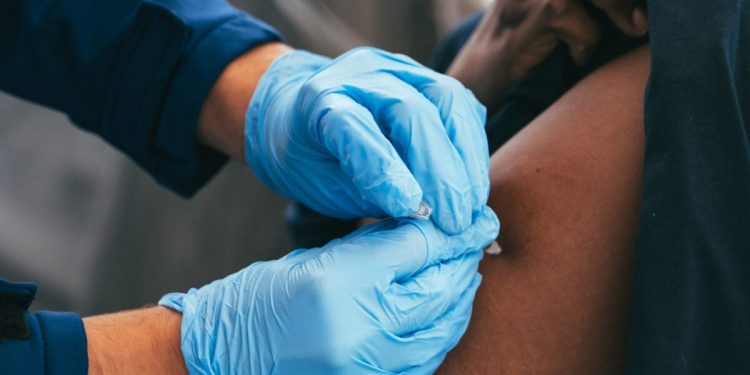People of color in the U.S. and UK were up to three times likelier than white people to report being unsure or unwilling to get a COVID-19 shot during the initial vaccine rollout, found a study published in Nature Communications. But among those who wanted the vaccine, Black people in the U.S. were less likely to receive it than white people, a disparity that wasn’t present in the UK.
“Our study suggests that lack of access to the COVID-19 vaccine among minority populations in the U.S., rather than lower willingness to receive the vaccine, may have played a greater role in the racial-ethnic disparities we experienced in the early phases of the U.S. vaccination campaign,” said senior author Andrew T. Chan, director of epidemiology at Mass General Cancer Center.
Chan and his team at Massachusetts General Hospital, along with research collaborators at King’s College London and the health science company Zoe Ltd., launched the study, which was designed to capture real-time data on COVID-19, in March 2020. Approximately 4.7 million participants in the U.S., UK, and Sweden reported daily information about their experiences with COVID-19 via a smartphone application. The data gave researchers insight on COVID-19 symptoms and risk factors as well as willingness to receive the vaccine.
This study assessed vaccine hesitancy and receipt from 1,254,294 participants in the UK and 87,388 in the U.S. between December 2020 and February 2021.
“We wanted to compare attitudes toward vaccines and how racial and ethnic minorities experienced receipt of vaccination in these two countries, both of which have racially and ethnically diverse populations that have been disproportionately affected by the COVID-19 pandemic,” Chan said. “From the outset, it was clear that the strategy for vaccine delivery was quite different in the UK than in the U.S. The UK relied on a centralized vaccine distribution system through the National Health Service, while the U.S. resorted to a fragmented approach, leading to widely uneven approaches by individual states and counties.”
Minority populations in both countries expressed more hesitancy or unwillingness to get the vaccine than did white participants. “The more cautious view of the new vaccines among people of color may reflect a greater longstanding mistrust of the medical system and skepticism of clinical trials, which historically have lacked adequate representation from people of diverse races and ethnicities,” Chan said.
Yet minority participants who overcame their hesitancy still faced a barrier in receiving the vaccine in the U.S., he said. Black participants in the U.S. were less likely to report that they had received a vaccine dose than white participants, even if they indicated that they were willing to get vaccinated. This disparity was not observed among UK participants.
“The centralized, national vaccine distribution in the UK appeared better able to deliver vaccines in a more equitable manner than our fragmented approach in the U.S.,” Chan said.
Access to the COVID-19 vaccine in the U.S. is currently less of a problem than it was earlier, when a shortage plagued the initial rollout. But there is still a need for continued outreach to overcome hesitancy among the unvaccinated, Chan said.
“An effective strategy is to enlist trusted messengers, such as members of the communities who are more skeptical of vaccines, to encourage vaccination and help overcome mistrust.”
The study’s results also demonstrated that the U.S. needs a more effective strategy for getting vaccines out quickly and efficiently. “Our experience with COVID-19 boosters taught us that vaccine delivery is still very inefficient in the U.S., with considerable confusion over who should get them and where,” Chan said. “Going forward, we need to be more thoughtful about vaccine distribution. If we can eliminate the access barrier, we can focus our energy on minimizing the greater challenge of vaccine hesitancy.” The next step for the researchers is to study the effectiveness of various strategies that can overcome vaccine hesitancy.
Chan is professor of medicine at Harvard Medical School and chief of the Clinical and Translational Epidemiology Unit at MGH. Other key authors include Long H. Nguyen, an investigator in the Departments of Medicine, Gastroenterology, and Hepatology at MGH and assistant professor of medicine; David A Drew, director of the Biobanking, Clinical and Translational Epidemiology Unit at MGH, and instructor of medicine; and Tim D. Spector, chief of the Department of Twin Research and Genetic Epidemiology and professor of genetic epidemiology at King’s College London.
The work was funded by the Massachusetts Consortium on Pathogen Readiness and the Stuart and Suzanne Steele MGH Research Scholars Award.






